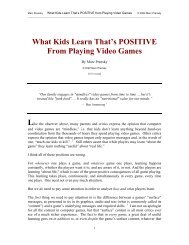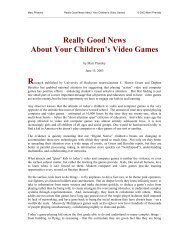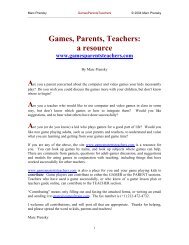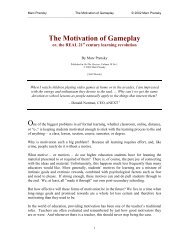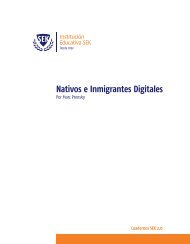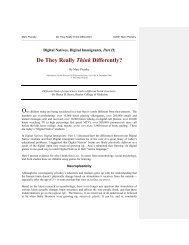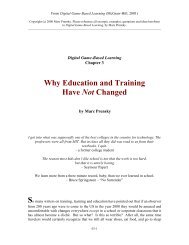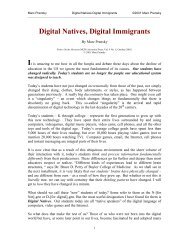Digital Wisdom - Marc Prensky
Digital Wisdom - Marc Prensky
Digital Wisdom - Marc Prensky
You also want an ePaper? Increase the reach of your titles
YUMPU automatically turns print PDFs into web optimized ePapers that Google loves.
<strong>Marc</strong> <strong>Prensky</strong> From <strong>Digital</strong> Natives to <strong>Digital</strong> <strong>Wisdom</strong> © 2011 <strong>Marc</strong> <strong>Prensky</strong><br />
_____________________________________________________________________________<br />
down. The next essay, “Simple Changes in Current Practices May Save Our Schools,”<br />
offers the powerful idea that there are a number of small changes that every teacher can<br />
make that will have an enormous impact on our kids’ education.<br />
The final essays in Part 2 deal with changes in our educational environment and context<br />
that don’t receive, in my view, the level of attention and understanding they deserve. The<br />
first of these is the arrival of “short video” as a new two-way communication form<br />
(“Why You Tube Matters”). The second is the importance of computer and video games<br />
in our students’ lives. Here I emphasize both the value the games bring to kids’ learning<br />
and education (“Beyond the Lemonade Stand”) and the problems kids often encounter<br />
when trying to get that learning acknowledged by their parents and educators (“On Being<br />
Disrespected”). I also offer a chart of “Types of Learning and Possible Game Styles” to<br />
aid in the design of better educational games.<br />
In “Let’s Be ‘<strong>Digital</strong> Multipliers,’” I address the concern of many teachers about the socalled<br />
digital divide. In “Search Versus Research,” I address teachers’ fears about their<br />
students’ unthoughtful use of the Internet. I conclude Part 2 with discussions of three<br />
additional technologies that I believe will shape our kids’ 21st century education for the<br />
better: simulation (“Simulation Nation”), mobile devices (“What Can You Learn From a<br />
Cell Phone? Almost Anything!”), and programming (“The True 21st Century Literacy Is<br />
Programming”).<br />
The book’s epilogue, “From <strong>Digital</strong> Natives to <strong>Digital</strong> <strong>Wisdom</strong>,” presents a hopeful view<br />
of the quickly coming era when all students and educators will be born in the 21st<br />
century—and will therefore, by definition, be “<strong>Digital</strong> Natives.” I suggest in that essay<br />
that the question we should ponder for that future is no longer whether to use the<br />
technologies of our time but rather how to use them to become better, wiser people.<br />
Included at the end of each part are a dozen questions intended to encourage you to<br />
reflect on the material you have just read, and to look for your own solutions. These<br />
questions should also prove helpful to any individual or group using the book in “study”<br />
mode.<br />
———<br />
While many today seek changes in our education, a huge question, mostly left unasked, is<br />
“What in education should evolve and change with the times, and what should not?” As<br />
we quest for a better, 21st century education for today’s and tomorrow’s children,<br />
figuring out the best solution to this thorny problem is perhaps our biggest educational<br />
challenge. In my view, most of today’s education reformers, when they bother asking this<br />
question at all, get it wrong. In order for us to get it right we will need a lot more of what<br />
we typically call “wisdom”—perhaps even “digital wisdom.” My hope is that—at least in<br />
some ways—you will find elements of this wisdom, both digital and otherwise, in these<br />
essays.<br />
8



